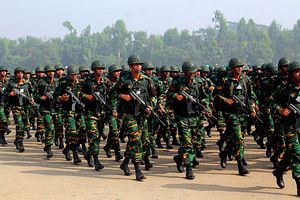After the unprecedented terrorist attack at an upscale restaurant in Bangladesh’s diplomatic enclave on July 1, this is the moment for a complete reassessment of counterterrorism in this South Asian nation. It took only six armed militants, claimed by Islamic State, to conduct a shootout, kill two police officers, and hold a 12-hour standoff while killing 20 hostages. Eventually army commandos were flown in from the northeast to end the ordeal. The government in Bangladesh has certainly taken some positive steps, but far more is necessary to halt a fall into the abyss. Bangladesh now faces a test with global ramifications.
To provide a historical backdrop, Islamists gained entry into Bangladesh after the democratically-elected Awami League government was overthrown in a military coup. In 1979, Jamaat-e-Islami was revived as a political party, as the military ruler required allies. Shortly thereafter, many from Bangladesh went to join the mujahideen in Afghanistan to defeat the Soviet invasion. U.S. President Jimmy Carter’s National Security Adviser Zbigniew Brzenzinski once explained on CNN how the United States organized and supported this group. He admitted that a few armed, radicalized Muslims were of less importance at the time than liberating Central Europe and ending the Cold War.
Harkat ul-Jihad al-Islami was one such group of ‘less importance’ formed in 1980 as part of the mujahideen. Returnees from the war in Afghanistan set up HuJI’s Bangladeshi wing in 1992. Today, the U.S. State Department has designated the group as a terrorist organization, and has charged it with running militant training camps in southeast Bangladesh. Similar to other nations, some of Bangladesh’s rulers chose to use militant Islamists for short-term political gains at the cost of long-term devastation. After brutal attacks in Iraq, Bangladesh, and Turkey, we see how unchecked militancy can wreak havoc across the globe.
A comprehensive counterterrorism strategy requires an ideological component. Bangladesh is already taking steps in that direction; Maulana Fariduddin Masoud, chairman of a Bangladeshi Islamic scholars’ organization, issued a religious decree in June that condemns terrorism and militancy. The campaign was launched last month after a meeting with law-enforcement officials, and this decree has been signed by over 100,000 Islamic scholars, legal experts, and clerics, those dedicated to promote the peaceful tenets of Islam. This Abrahamic religion holds the same roots as Judeo-Christian beliefs; the barbaric terrorism manifested by militants can best be ideologically countered by Islamic scholars who can espouse the legitimate teachings of Islam. Masoud’s religious decree should be distributed from the slums to the high-rises of the nation.
Next, the government’s operational strategy requires significant changes. Last month, an anti-militancy drive by law enforcement led to over 11,000 arrests. However, less than 200 of those arrested have been identified as militants; the rest were drug peddlers and petty criminals. This is unsustainable, as the courts and prison system are not equipped to handle thousands of cases. The government must focus on Islamist militants; this is the highest priority in Bangladesh. In an investigative report by The New York Times, it was revealed that Bangladeshi police have identified the top leadership of two Islamist militant groups, and believe that only by apprehending the leaders and diminishing the allure of fundamentalism can the attacks be halted. It is imperative that the ruling party remove any political obstacles that may hinder the police from conducting their sworn duties.
On a similar note, the Bangladesh Army 1st Para-commando Battalion must be deployed immediately if a similar situation takes place again. This battalion, which has received counterterrorism training from the U.S. Special Operations Command Pacific, has been credited with storming the restaurant and eliminating the terrorists. If the Rapid Action Battalion and Border Guard Bangladesh, two paramilitary groups who were among the emergency responders, cannot take similar action, the nation cannot wait once again for the prime minister to give approval to deploy the army commandos. Administrative mechanisms should be taken to have the nation’s armed forces ready to battle terrorists at anyplace, anytime. As UN peacekeepers, the Bangladesh Army has shown high effectiveness in war-torn lands; it is time to administer peace in their homeland as well.
Finally, it is not merely a coincidence that the Islamist militant attacks started in February 2013, just as the government increased its suppression of the opposition, eventually leading to a boycotted election where only the ruling party stood and won the parliamentary seats. This suppression has continued down to the local level, with ballot boxes being snatched by ruling party members. It is high time to start a dialogue with the opposition; Bangladesh needs all political stakeholders to come together to solve this threat of militancy. The opposition has called for a national dialogue; if they are truly guilty of fostering terrorism, as repeatedly claimed by the government, call their bluff and see if they are serious about solving this crisis.
Bangladesh is an amazingly resilient land; it has climbed Himalayan heights from the ashes of the Liberation War of 1971 to become a model for economic growth. It is one of the largest suppliers of United Nations peacekeeping forces and the second-largest garments exporter in the world. The nation has come too far and passed through far too many man-made and natural disasters to let the menace of Islamist militancy ruin all the progress made across decades. By implementing an effective counterterrorism policy, the sun will shine again on golden Bengal.
Tamim Choudhury is a Texas-based communications specialist with a master’s degree in public administration from the Bush School at Texas A&M University.
































